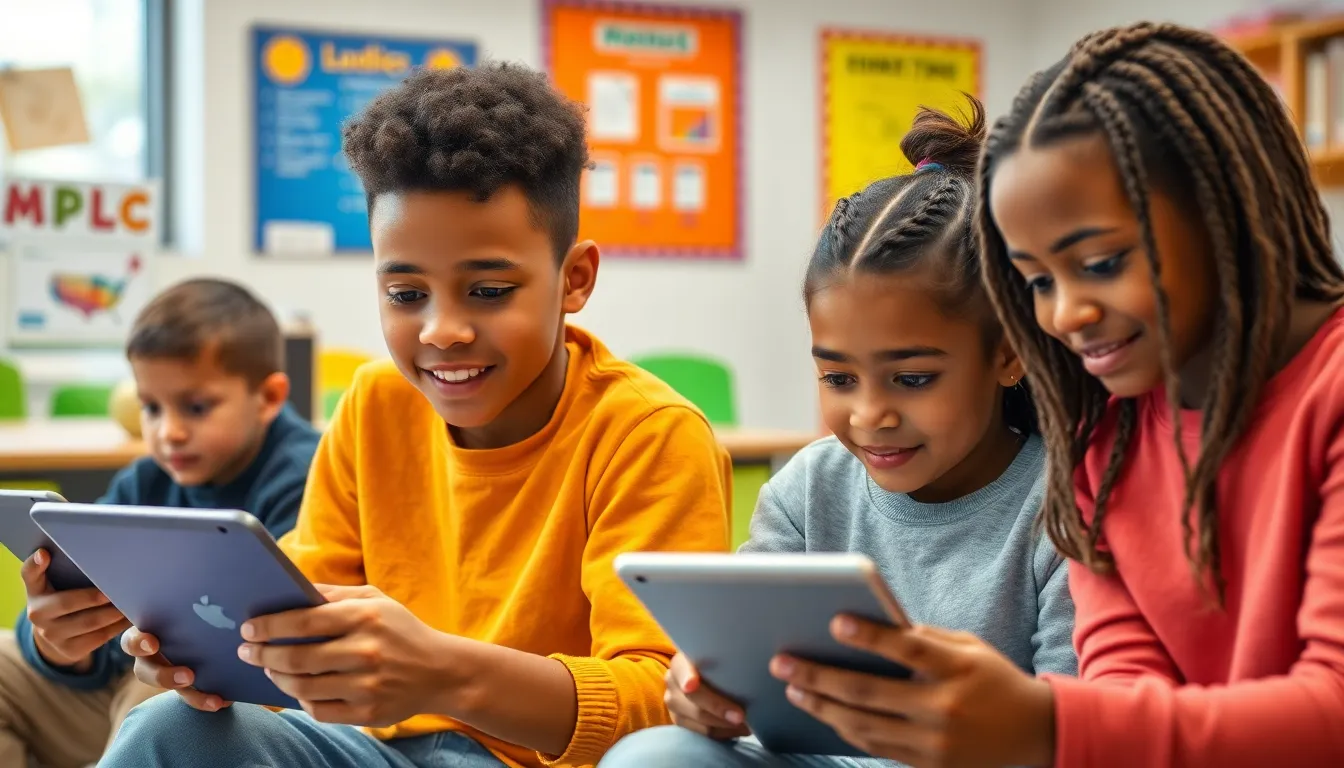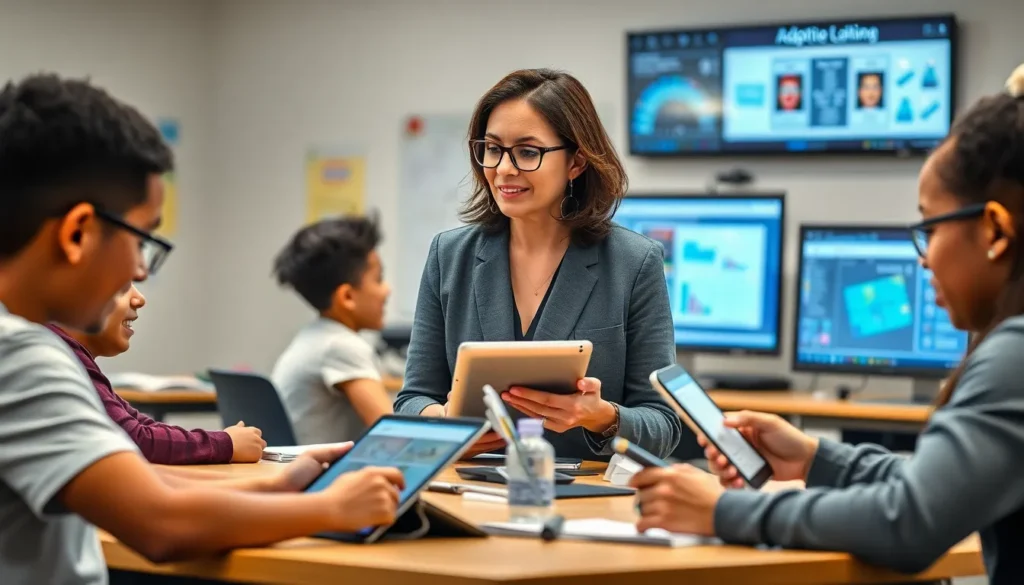In today’s fast-paced educational landscape, personalized learning technology is transforming how students engage with their studies. This innovative approach tailors educational experiences to meet individual needs, preferences, and learning styles. With the rise of digital tools, educators can now create customized pathways that empower students to take charge of their own learning.
As schools increasingly adopt these technologies, they’re not just enhancing academic performance but also fostering a deeper connection between students and their education. Personalized learning technology offers a wealth of resources, from adaptive learning platforms to data-driven insights, ensuring that every learner can thrive. Embracing this shift could be the key to unlocking each student’s full potential in an ever-evolving world.
Table of Contents
ToggleOverview of Personalized Learning Technology
Personalized learning technology customizes educational experiences based on individual student needs, preferences, and learning styles. This approach enhances student engagement and performance across diverse academic landscapes.
Definition and Significance
Personalized learning technology refers to digital tools and platforms that adapt educational content and methodologies to meet unique learner requirements. These technologies utilize data analytics to create tailored educational pathways. By focusing on individual progress, schools can foster deeper connections between students and their learning processes. Such technologies not only enhance comprehension but also promote greater equity in education, allowing all students to thrive regardless of their backgrounds.
Key Components
- Adaptive Learning Platforms: Adaptive platforms assess student knowledge in real-time, adjusting content and difficulty based on performance metrics. These platforms provide personalized quizzes, exercises, and resources.
- Learning Analytics: Learning analytics involves data collection and analysis to track student progress. It identifies patterns and insights, informing instructional adjustments and supporting targeted interventions.
- Student-Centered Resources: Student-centered resources include tools like interactive simulations, gamified learning experiences, and multimedia content tailored to different learning preferences. These resources engage students more effectively than traditional methods.
- Collaboration Tools: Collaboration tools facilitate communication between students and instructors. These platforms enable discussions, group projects, and feedback loops that enhance the collaborative learning experience.
- Assessment Tools: Assessment tools support formative and summative evaluations tailored to individual learners. They provide insights into student performance, ensuring timely feedback that guides further learning opportunities.
Benefits of Personalized Learning Technology

Personalized learning technology offers numerous advantages, transforming how students engage with their education. This innovative approach fosters an enriching learning environment tailored to individual needs.
Enhanced Student Engagement
Enhanced student engagement arises from customized learning experiences. Personalized platforms enable students to explore topics that resonate with their interests. Immediate feedback from adaptive learning tools encourages continuous improvement, making learning more interactive and motivating. In turn, these technologies reduce dropout rates and increase students’ intrinsic motivation, creating a more vibrant educational atmosphere.
Improved Learning Outcomes
Improved learning outcomes stem from personalized approaches that target each student’s unique strengths and weaknesses. Data-driven insights allow educators to identify specific areas where students may struggle and adjust instruction accordingly. Personalized learning often leads to higher academic achievement, as students experience content that matches their proficiency levels. Research shows that learners in personalized settings significantly outperform their peers in standardized assessments, highlighting the effectiveness of tailored educational paths.
Types of Personalized Learning Technology
Personalized learning technology encompasses various tools designed to customize the educational experience. Key types include adaptive learning software and learning management systems.
Adaptive Learning Software
Adaptive learning software utilizes algorithms to analyze student data in real time. This software adjusts the difficulty and type of content based on individual performance, ensuring each learner receives instruction tailored to their needs. For example, platforms like DreamBox and Smart Sparrow adapt lessons dynamically based on ongoing assessments. This technology engages students by providing personalized pathways that match their unique strengths and weaknesses, enhancing overall understanding and retention.
Learning Management Systems
Learning management systems (LMS) serve as centralized platforms for educators to manage and deliver personalized content. These systems, such as Canvas and Blackboard, allow teachers to create customized learning modules and track student progress. An LMS can provide insights into student performance, enabling educators to identify trends and areas that require intervention. By offering resources like forums, quizzes, and multimedia content, an LMS fosters collaboration and supports diverse learning styles through structured, individualized learning experiences.
Challenges in Implementing Personalized Learning Technology
Personalized learning technology faces several challenges that can hinder effective implementation in educational settings. These challenges include technical barriers and the need for comprehensive teacher training and support.
Technical Barriers
Technical barriers significantly impact the implementation of personalized learning technology. Limited infrastructure, such as unreliable internet connectivity or outdated hardware, restricts access for both students and educators. Data privacy concerns also arise, as educational institutions must ensure compliance with regulations like FERPA and COPPA while handling sensitive student information. Additionally, interoperability issues between different systems can complicate the integration of various digital tools. Without seamless connections, valuable data may remain siloed, preventing a holistic view of student progress. Schools must invest in robust technical solutions and infrastructure upgrades to overcome these challenges effectively.
Teacher Training and Support
Teacher training and support remain critical for the successful integration of personalized learning technology. Educators must understand how to use these tools effectively to maximize their potential. Insufficient training can lead to underutilization of resources and skepticism toward new methodologies. Ongoing professional development opportunities are essential to equip teachers with the skills necessary for effective implementation. Providing comprehensive support, including access to mentors and collaborative learning communities, helps educators share best practices and address challenges collectively. Ensuring that teachers feel confident using personalized learning technologies ultimately enhances the educational experience for students.
Future Trends in Personalized Learning Technology
Personalized learning technology continues to evolve, driven by emerging innovations and the increasing need for customized educational experiences. Several trends are shaping the future landscape.
Emerging Technologies
Artificial intelligence (AI) enhances personalized learning through real-time data analysis and adaptive content delivery, tailoring educational materials to match individual student needs. Machine learning algorithms allow platforms to predict learning behaviors, enabling educators to intervene effectively. Virtual and augmented reality (VR/AR) create immersive learning environments, providing experiential learning opportunities that cater to diverse learning styles. Blockchain technology offers secure credentials and academic records, fostering trust in achievements while streamlining administrative processes. Additionally, Internet of Things (IoT) devices can collect extensive data on student interactions with learning resources, facilitating ongoing personalization based on real-world engagement.
Predictions for Educational Impact
Personalized learning technology is set to redefine educational outcomes significantly. Students are expected to demonstrate improved retention and understanding as tailored content addresses their learning preferences. Research indicates that personalized pathways will reduce achievement gaps, with disadvantaged students benefiting from customized experiences that meet their unique challenges. Educators may enhance instructional strategies through data-driven insights, allowing for more effective teaching adaptations. Higher engagement levels among students often lead to increased intrinsic motivation, contributing to a more positive perception of education. Long-term, the integration of these technologies is likely to empower educators, providing them with the tools necessary to foster a more equitable and effective learning environment.
Personalized learning technology is reshaping education by creating tailored experiences that cater to individual student needs. This innovative approach not only enhances engagement but also fosters a sense of ownership in learning. As schools continue to embrace these digital tools, they can expect improved academic outcomes and a more equitable environment for all learners.
The ongoing development of adaptive learning platforms and data analytics is paving the way for a future where education is more responsive and effective. By investing in the right infrastructure and training, educators can harness the full potential of personalized learning technology, ultimately transforming the educational landscape for generations to come.










